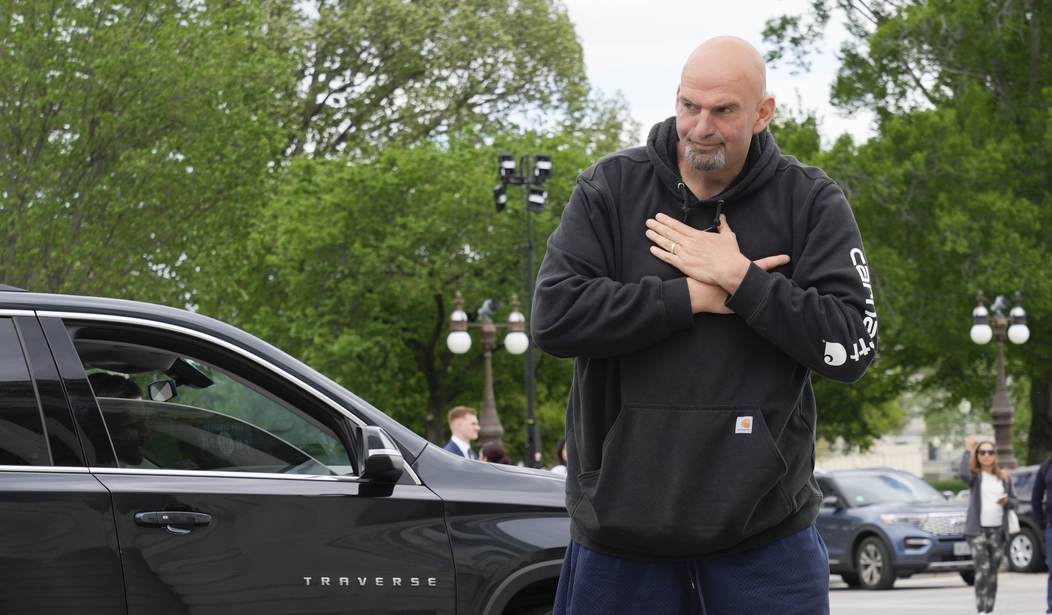I don’t care about the Senate’s dress code. But the controversy over the upper chamber relaxing its standards for Sen. John Fetterman (D-PA), who somehow needs to wear hoodies and shorts every day highlights an underlying reality that we should not miss.
For those who are not familiar, the Senate recently changed its rules regarding what lawmakers should wear when they are supposedly doing their jobs at the U.S. Capitol.
The decision was made to accommodate Sen. Fetterman, who suffers from clinical depression.
But now the Democrats are taking a step to change the Senate dress code. For senators, mind you, not for anyone else who enters the chamber.
Fox's Chad Pergram posted that now Senators can wear whatever they want, but others must comply with the dress code, which is: "Coats/ties for men. Business attire for women."
This is coming from Sen. Chuck Schumer (D-NY), who, as Senate Majority Leader, directed the Senate's Sergeant at Arms to stop enforcing the rules. "Senators are able to choose what they wear on the Senate floor. I will continue to wear a suit," Schumer told Axios.
In the grand scheme of things, our lawmakers’ fashion choices are quite low on my list of priorities. If we had government officials who wore sackcloth to work every day but kept the state from making life harder for Americans, I wouldn’t even bat an eye.
However, what this debacle showed me is that our elected officials are more than adept at coming together to change rules regarding their clothing, but have failed in so many ways when it comes to protecting our rights and addressing the problems Americans are facing today.
Let’s put things into perspective, shall we?
Americans are currently grappling with mounting inflation rates, which is making it harder for people to feed their families. Economic woes have placed a financial strain on millions of households across the country. Families are struggling to put food on the table.
On top of this, crime rates are still a huge problem for many Americans. In many areas, rates of criminal activity have risen drastically, which is placing more people in danger – especially in states that only want violent criminals to have firearms.
Moreover, the crisis at the southern border is far from solved. Tons of illegal immigrants and asylum seekers have crossed the border, seeking entry into the United States. The problem has strained the budgets of many of America’s major cities. Yet, our immigration system remains broken, as it has been for decades.
Americans are also deeply concerned about the state of our education system. In many areas of the country, children are receiving substandard education from school districts that would rather have teachers dish about their sex lives rather than teach them how to read, write, and do math. Children are graduating high school without being able to perform at adequate levels as adults.
Healthcare is also a problem. Too many people are having trouble paying exorbitant costs to take care of their health. Mental health, in particular, is a serious matter that only worsened during the COVID-19 pandemic. Many have turned to dangerous drugs, much of which are laced with fentanyl coming over the southern border, which has resulted in tens of thousands of overdose deaths.
So far, the government has done little to nothing to address any of these issues, nor has it bothered to halt their activities that only make these problems worse. But hey, at least Fetterman can wear a hoodie and shorts on the Senate floor, right?
All jokes aside, it is understandable that folks might want their lawmakers to look at least a little better than a bum on the street. But this debacle should cause us to stop and question why they can work together to solve wardrobe issues but not on issues that actually matter.
The reality is that, if they wanted to, they could come up with solutions to the issues America is facing. The problem is that they don’t. When was the last time the federal government actually solved a problem? It is not easy to recall a time when this happened, is it?
Regardless of which party is running the federal government, it is clear that they are either unable or unwilling to address the issues they were elected to address. So the ultimate question is this: Why do we continue to allow them to have power?













